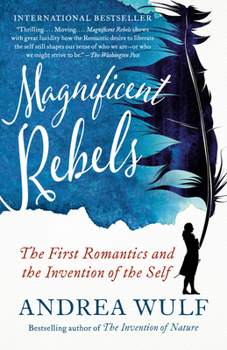Magnificent Rebels: The First Romantics and the Invention of the Self
Select Format
Select Condition 
Book Overview
A NEW YORKER ESSENTIAL READ - From the best-selling author of The Invention of Nature comes an exhilarating story about a remarkable group of young rebels--poets, novelists, philosophers--who, through... This description may be from another edition of this product.
Format:Paperback
Language:English
ISBN:1984897993
ISBN13:9781984897992
Release Date:October 2023
Publisher:Vintage
Length:528 Pages
Weight:1.10 lbs.
Dimensions:1.2" x 5.2" x 8.1"
Related Subjects
Biographical Biographies Biographies & History Biography & History History PhilosophyCustomer Reviews
1 rating
Goethe, Schiller and Company
Published by Izaak VanGaalen , 3 months ago
It all began in a small town in Germany more than 200 years ago. Between 1794, when Goethe arrived, and 1806, when Napoleon arrived, Jena was the capital of European freethinkers. The French Revolution and the liberal constitution of the University of Jena inspired writers, philosophers, and intellectuals from far and wide to participate in this new movement, which came to be known as Jena Romanticism.
Andrea Wulf provides a vast parade of characters, sometimes making it difficult to keep track of their relationships and feuding. They are all strong characters who quarrel often. I find it best to keep in mind Goethe and Schiller are the elder statesmen and founders. Then come the Schlegel brothers, August and Friedrich, famous translators, literary critics, and founders of the seminal journal Athenaeum. Equally prominent in this story were their wives, Caroline and Dorothea, renowned for their literary salons, lovers, divorces, and upending the status quo in general. Finally, we are told of Schelling and Fichte, two radical young philosophers who revolutionized philosophy. Fichte put individual autonomy at the center of the philosophical world by declaring the self as "the source of all reality." Such was the invention of the self and the birth of the Romantic movement.
The Jena Romantics later inspired the English Romantic poets and the American Transcendentalists, liberating them from the strictures of Classicism. However, there was also a dark side to all this liberation—there always is. Napoleon plundered Jena in 1806, possibly seeing his vision of reality as the only one. Such was the end of the Jena Romantics. At the time, Hegel - another denizen of Jena - wrote of Napolean as a "world-historical" figure, having all of reality concentrated on this individual. Some of the Jena group praised Napoleon, but that is another story.





